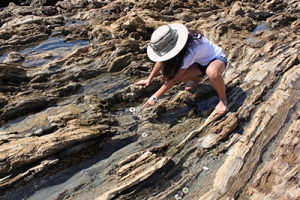
Did you know that a scientific collecting permit (SCP) may be required for non-lethal research or educational activities, such as installing scientific equipment or conducting docent-led tidepool surveys for school groups? In fact, nearly all research and many educational activities carried out in California marine waters, especially in marine protected areas (MPAs), require this permit.
It may be unclear whether you need an SCP when an activity is not “directly collecting” anything. Most people associate SCPs with activities that physically remove one or more organisms from a site. While this is a logical assumption, it is only part of the restrictions that would necessitate obtaining an SCP…so let’s dig a little deeper by reviewing the rules governing both SCPs and MPAs.
The California Department of Fish and Wildlife (CDFW) is the permitting agency for managing scientific and educational activities in state marine waters, which extend from the mean high tide line to three nautical miles offshore, including off all intertidal and offshore rocks, offshore islands, and the mouths of embayments, including large open bays. The following laws and regulations govern how SCPs are issued:
Fish and Game Code (FGC) §1002(a) states, “The department may issue permits, subject to restrictions and regulations that the department determines are desirable, to take or possess, in any part of the state, for scientific, educational, or propagation purposes, mammals, birds and the nests and eggs thereof, fish, amphibians, reptiles, or any other form of plant or animal life.”
California Code of Regulations Title 14, §650(a) states, “Except as otherwise provided, it is unlawful to take or possess marine plants, live or dead birds, mammals, fishes, amphibians, or reptiles for scientific, educational, or propagation purposes except as authorized by permit issued by the department. Notwithstanding FGC §86, take includes capturing, marking, and releasing any animal.”
The word “take” was emphasized in both excerpts above, because the definition of “take” sets the bar for being in compliance with the law. Take means to “Hunt, pursue, catch, capture, or kill or attempt to hunt, pursue, catch, capture, or kill” (FGC §86). Therefore, should any proposed activity result in any of these things occurring inside or outside an MPA in the name of education or research, a SCP would be required.

Focusing on MPAs, the rules become more strict. SCPs are required when activities within an MPA may “injure, damage, take, or possess any living, geological, or cultural marine resource….” [California Code of Regulations Title 14, §632 (a)(1)(A)-(C); Public Resources Code §36710]. Again, the emphasis above represents the three conditions of the law that are typically referred to when explaining why an activity would require an SCP. For example, conducting plankton tows for an at-sea classroom demonstration (possession of marine resources) in an MPA would require an SCP.
The requirement to apply for a permit to conduct non-invasive activities may seem unnecessarily burdensome, but obtaining an SCP is important for a number of reasons. First, it provides the CDFW with the ability to track educational and research activities happening in the state waters, which is especially important within MPAs. Second, it provides the CDFW with the opportunity to better manage the state’s resources by providing feedback to the applicant before the project takes place. Finally, and most importantly, it ensures that researchers and educators are in compliance with the law.
So if you think your educational and/or research activity may need an SCP, you should do one of two things:
- Submit an application for an SCP that can be downloaded from the CDFW website, or
- Call or email me (contact information below), and I would be more than happy to help you figure out whether an SCP is required for the activity you are proposing.
Either way, the CDFW will strive to ensure a smooth permitting process for you, and we will be happy to resolve any issues you come across during the application process. Until then, don’t forget the SCP!
Contact Information:
Brian Owens (Marine Environmental Scientist), California Department of Fish and Wildlife
Brian.Owens@wildlife.ca.gov or (650) 631-6786
For more information about scientific collecting within MPAs, please visit the CDFW website.
post by Brian Owens, CDFW Marine Environmental Scientist ♦ photo of researchers at Pyramid Point SMCA by D. Lohse ♦ CDFW photo of interpreter by S. Hubbard

